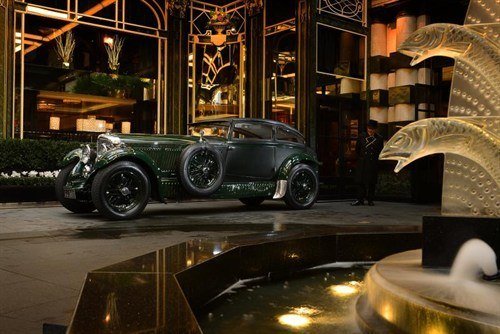‘Blue Train’ Bentley to star at Paris classic car show

The legendary Speed Six Bentley known as The Blue Train will celebrate the start of its 85th anniversary with an exclusive first appearance at the Rétromobile Exhibition this week in Paris.
In 1930, Captain Woolf Barnato, chairman of Bentley Motors, was staying in Cannes at the Carlton Hotel with his golfer friend, Dale Bourn. He accepted a wager that he could not only beat the Blue Train to Calais, as had been done before, but could be at his club in London before the train reached Calais.
On the day of the race, he finished his drink in the bar at the Carlton hotel when he heard the train had departed at 17.54. He had arranged for fuel stations to remain open through the night in Aix-En-Provence and Lyon, and a tanker lorry in Auxerre, and despite a puncture near Paris, he reached Boulogne with an hour to spare. He arrived at the Conservative Club in St James, London for a celebratory drink having passed the clock at Victoria Railway Station at 15.30 the next day, four minutes before the train was due to arrive in Calais, having averaged 43.43mph driving on pre-motorway roads. He won the £100 wager, although the Automotive Club de France attempted to fine him £200 for an un-authorised race in France.
Richard Charlesworth, Head of the Bentley Heritage Collection, comments: ‘We are most grateful to Bruce McCaw for the loan of his legendary Bentley Speed Six. There are many exciting plans for the car to mark its 85th anniversary, including a recreation of the original run from Cannes to London.’
The Speed Six evolved in 1929 as a racing version of the 6½ Litre, introduced in 1926. The first car raced as No 1 at Le Mans in 1929 where it won, and returned as ‘Old No 1’ to win again in 1930. A total of 182 Speed Sixes were built between 1929 – 1930 with a variety of body styles and types from several coachbuilders. Speed Six Chassis No HM 2855 was delivered to Bentley Chairman Woolf Barnato by Coachbuilder Gurney Nutting in May 1930. Barnato had many Bentleys personally commissioned to suit his requirements, all were bespoke, ‘one off’ vehicles.
In recent years evidence has come to light that suggests that although the car appeared in the Terence Cuneo painting of the race, it may be that it was in fact another Speed Six with a Mulliner Saloon body, also owned by Barnato, that actually accomplished the feat. It remains a mystery, the truth will never be known for sure, but this unique car remains one of the most striking, stylish and famous vintage Bentleys from that era.

Compare classic car insurance quotes and buy online. A friendly service offering access to a range of policies and benefits.


 Keith Moody
Keith Moody
 NEC classic motor show 2020 postponed due to Covid 19 concerns
NEC classic motor show 2020 postponed due to Covid 19 concerns
 Classic car auction house Coys goes into administration
Classic car auction house Coys goes into administration
 Motor racing great Sir Stirling Moss dies aged 90
Motor racing great Sir Stirling Moss dies aged 90
 Alfa Romeo anniversary races set for Silverstone
Alfa Romeo anniversary races set for Silverstone
 Government to make E5 fuel available for classic owners
Government to make E5 fuel available for classic owners
 Plans to introduce cleaner fuel could damage more than a million classic cars
Plans to introduce cleaner fuel could damage more than a million classic cars
 Top 10: Classic cars from the Gulf motor racing heritage collection
Top 10: Classic cars from the Gulf motor racing heritage collection


